Sep 2014
Woodstock love-in lifts volunteers' spirits
Sep/23/14 05:19 PM
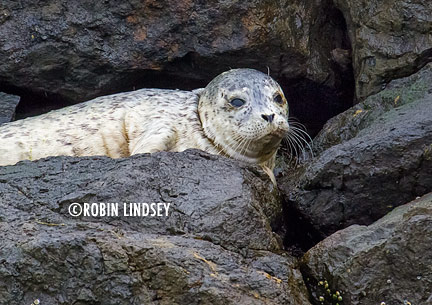
The pup had apparently come up at the early morning high tide. Because of the cool, drizzly weather there were few pedestrians out and about. Eventually, however, it was necessary to set a tape perimeter to keep the several dozen curious people from standing too close, disturbing him and potentially causing a fall and injury. Health assessment photos taken with a long telephoto lens revealed some scrapes and nicks, but nothing significant that we could see - other than being much too thin, always a concern with often dire consequences. An image which captured a wide yawn revealed a full rack of teeth, indicating he (or she) was recently weaned.
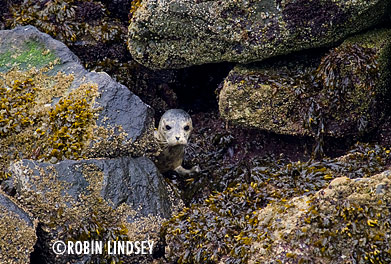
Seemingly uninjured, Woodstock quickly slid off into the still, gray water. Rain-doused volunteers were relieved to observe him actively splashing around offshore with another seal pup - hopefully, both foraging for the small fish that frequent the cove.
It was a lovely day with rainbows and soft rain, barking sea lions, cormorants and two beautiful little pups. Thanks to everyone for giving Woodstock some peace and love.
Seal season off to a rough start in West Seattle
Sep/21/14 06:19 PM
Each harbor seal pupping season (late June - September in South Puget Sound) seems to have its own unique properties. We hate to say it, but this 2014 season is off to a bleak start in West Seattle.
Some years, Seal Sitters MMSN (SSMMSN) responds to lots of pups who show up only for a day or so. Other years, we’ll have a number of pups, successfully making the transition from nursing on mom’s rich milk to foraging on their own, who come ashore for many days in a row (like Spanky and Queen Latifah, both of whom hauled out every day for two months) - the years we seemed to have a surplus of small forage fish in the Fall.
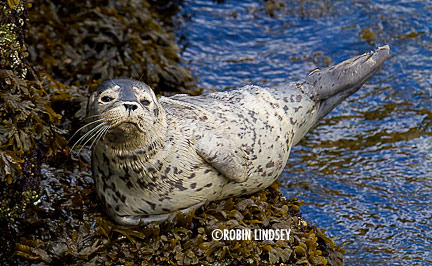 Most years, we have a mix of some healthy pups (like Queen Latifah at left on her rocky throne in 2011) to offset the many struggling ones. The last few years, however, we have had way too many terribly thin pups who didn’t survive. So, the stranding network never knows quite what to expect.
Most years, we have a mix of some healthy pups (like Queen Latifah at left on her rocky throne in 2011) to offset the many struggling ones. The last few years, however, we have had way too many terribly thin pups who didn’t survive. So, the stranding network never knows quite what to expect.
The 2014 season so far has had its quirks, too. For the first time in our 8 years as a stranding network, in early June we had a full lanugo, month-premature pup, believed to have been born on busy Alki Beach. Nicknamed Luigi, he was the earliest newborn pup on record for West Seattle. Sadly, the tiny, abandoned pup had to be euthanized. Another abandoned, but full-term pup was rescued by Seal Sitters from the craggy rocks at Duwamish Head at the end of June. This pup, Junebug, was successfully rehabbed at PAWS Wildlife Center and released back to the wild on August 26th.
To date, Junebug is the only highlight in what is shaping up to be a very disheartening season. Statistically, seal pupping season in West Seattle is recorded from our first response to a newborn pup in the calendar year (usually in mid-late July or August) through the end of the year as pups continue to use the shoreline. We have had fewer responses than our record-breaking season last year, but already have a higher dead pup count in this recent period from the lanugo pup in early June through September 20th. A full third of our responses this season have been to dead pups or pups that subsequently died.
Disturbingly, we have had three pups die in recent weeks with numerous bite wounds to the head and body. Are the seal pups getting roughed up before leaving the rookeries by adult males, intent on mating and competing for space - or are they being attacked on our shores by off-leash dogs or coyotes? That is a question we most likely cannot answer with limited funding for necropsies.
While there is indeed a 50% mortality in the wild for seal pups the first year, the percentage of Seal Sitters MMSN’s responses to dead seal pups just seems to be higher the past few years. We want to be clear that our numbers do not necessarily reflect Puget Sound populations as a whole and the harbor seal population is considered healthy and is not endangered. Other areas may have a more plentiful food source and more successful pups.
We did have high hopes for a bumper crop of healthy pups visiting West Seattle this year, based on reports from biologists observing moms and pups at South Puget Sound rookeries. Apparently, there was less predation, pup abandonment and death this season at one historic harbor seal haulout. As of last week at that island rookery south of Tacoma, only 24 pups (2 of those still nursing) remained - the other chubby 100 or so newly weaned pups had already dispersed, headed elsewhere to forage and rest. Perhaps some of those pups will head our way, evening out responses to emaciated ones.
As we mention over and over in these posts, harbor seal pups are in a daily struggle to survive - and health can take a dramatic downturn in just a matter of days. Undisrupted rest can truly make the difference between life and death. With the approaching wet chill of fall and winter months, seal pups face many challenges ahead of them. While Seal Sitters volunteers can’t control the effects of pollution, disease or declining fish stocks (including that of two sustaining forage fish for seal and sea lion pups: Pacific herring and sardines), what we can do is help pups rest and warm up, giving them a better chance at survival. Additionally, we can spread some powerful education about these amazing animals who share equal time in the sea and on land.
Despite the emotional ups and downs for volunteers, Seal Sitters MMSN will always do our best to ensure that seal pups are protected - free from stress - while resting on our shores. You can help. Please, call our dedicated hotline at 206-905-SEAL (7325) if you see a marine mammal, dead or alive, on public or private beach.
Some years, Seal Sitters MMSN (SSMMSN) responds to lots of pups who show up only for a day or so. Other years, we’ll have a number of pups, successfully making the transition from nursing on mom’s rich milk to foraging on their own, who come ashore for many days in a row (like Spanky and Queen Latifah, both of whom hauled out every day for two months) - the years we seemed to have a surplus of small forage fish in the Fall.

The 2014 season so far has had its quirks, too. For the first time in our 8 years as a stranding network, in early June we had a full lanugo, month-premature pup, believed to have been born on busy Alki Beach. Nicknamed Luigi, he was the earliest newborn pup on record for West Seattle. Sadly, the tiny, abandoned pup had to be euthanized. Another abandoned, but full-term pup was rescued by Seal Sitters from the craggy rocks at Duwamish Head at the end of June. This pup, Junebug, was successfully rehabbed at PAWS Wildlife Center and released back to the wild on August 26th.
To date, Junebug is the only highlight in what is shaping up to be a very disheartening season. Statistically, seal pupping season in West Seattle is recorded from our first response to a newborn pup in the calendar year (usually in mid-late July or August) through the end of the year as pups continue to use the shoreline. We have had fewer responses than our record-breaking season last year, but already have a higher dead pup count in this recent period from the lanugo pup in early June through September 20th. A full third of our responses this season have been to dead pups or pups that subsequently died.
Disturbingly, we have had three pups die in recent weeks with numerous bite wounds to the head and body. Are the seal pups getting roughed up before leaving the rookeries by adult males, intent on mating and competing for space - or are they being attacked on our shores by off-leash dogs or coyotes? That is a question we most likely cannot answer with limited funding for necropsies.
While there is indeed a 50% mortality in the wild for seal pups the first year, the percentage of Seal Sitters MMSN’s responses to dead seal pups just seems to be higher the past few years. We want to be clear that our numbers do not necessarily reflect Puget Sound populations as a whole and the harbor seal population is considered healthy and is not endangered. Other areas may have a more plentiful food source and more successful pups.
We did have high hopes for a bumper crop of healthy pups visiting West Seattle this year, based on reports from biologists observing moms and pups at South Puget Sound rookeries. Apparently, there was less predation, pup abandonment and death this season at one historic harbor seal haulout. As of last week at that island rookery south of Tacoma, only 24 pups (2 of those still nursing) remained - the other chubby 100 or so newly weaned pups had already dispersed, headed elsewhere to forage and rest. Perhaps some of those pups will head our way, evening out responses to emaciated ones.
As we mention over and over in these posts, harbor seal pups are in a daily struggle to survive - and health can take a dramatic downturn in just a matter of days. Undisrupted rest can truly make the difference between life and death. With the approaching wet chill of fall and winter months, seal pups face many challenges ahead of them. While Seal Sitters volunteers can’t control the effects of pollution, disease or declining fish stocks (including that of two sustaining forage fish for seal and sea lion pups: Pacific herring and sardines), what we can do is help pups rest and warm up, giving them a better chance at survival. Additionally, we can spread some powerful education about these amazing animals who share equal time in the sea and on land.
Despite the emotional ups and downs for volunteers, Seal Sitters MMSN will always do our best to ensure that seal pups are protected - free from stress - while resting on our shores. You can help. Please, call our dedicated hotline at 206-905-SEAL (7325) if you see a marine mammal, dead or alive, on public or private beach.
Sad ending for sweet seal pup along westside shoreline
Sep/20/14 04:10 PM
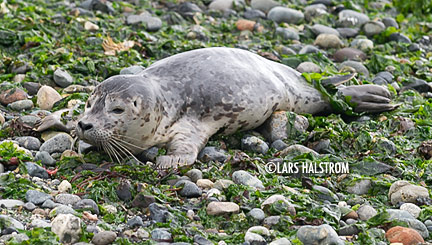
Late Thursday morning, Seal Sitters’ hotline operator fielded a call about a harbor seal pup at Lowman Beach, a small public park along Beach Drive. First responder Lars found the pup resting just above the line of kelp that indicated the high tide mark (photo).
He stretched yellow tape between stakes and driftwood to create a safety zone and called the day’s scheduler, who began the process of lining up volunteers in 2-hours shifts throughout the blustery day. The pup was still sleeping on the pebbled beach when volunteers left after darkness fell that night.
The spotted pup was still onshore early Friday morning. We’re not sure if he returned to the water during the night or not. He did finally make the journey back to the Sound around noon and was seen “bottling” (a normal seal behavior, resting vertically with nose and head held just above the water’s surface) for some time and then vanished.
A comparison of facial markings from i.d. photos revealed that the seal was Plum, a frequent occupant of the offshore “Alki platform” (a considerable distance to the north at the west end of Alki Beach). Just over a week ago, Plum had come ashore on private property directly across from the platform to rest under the watchful eye of homeowners. He stretched and yawned and was on the plump side for a newly weaned seal pup. Thursday morning at Lowman, however, the pup looked decidedly thinner and lethargic. Volunteers were encouraged when Plum returned to the Sound around noon to forage, since a skinny pup’s health can slide downhill quickly.
Around 7pm Friday evening, the hotline received a report of a pup onshore at private property just to the north. In fast approaching darkness, first responders were able to identify the pup as Plum. Sadly, early Saturday morning we received a call of a dead pup just yards from where Plum was last seen resting.
Our responder carefully examined tiny Plum for injuries and clues to cause of death. The male weaned pup was shockingly thin, weighing a mere 8.15 kg (less than birth weight) - a far cry from the alert, semi-chubby one we had seen just a week earlier. Plum had numerous puncture wounds to the snout, head and flippers - similar to the puncture wounds of two other pups who died recently along this stretch. One of the punctures on the mouth was abscessed and perhaps caused difficulty foraging. With limited funding for necropsies, we can only surmise the cause of Plum’s death - certainly emaciation was primary. Without an internal exam there is no way to know if the wounds contributed to the death or if there were additional underlying factors.
Plum was marked with a biodegradable grease pen for identification purposes and the responder placed his body back into the Sound to nourish other marine life. Truly, this was a very sad day for us all.
Rescued and rehabbed pup Junebug goes home to the wild
Sep/18/14 06:10 PM
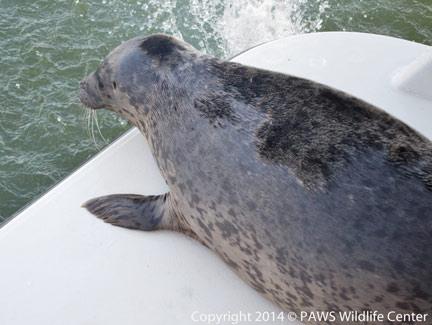
The abandoned and estimated only 5-8 day old pup was rescued by Seal Sitters MMSN from West Seattle’s Duwamish Head on July 1st. He weighed only 8.6 kg upon intake at the Lynnwood urgent care facility. Junebug was a whopping 31.1 kg on release day (see photo courtesy of PAWS). The tubby pup was released at a known harbor seal haulout near Everett with the help of the Coast Guard.
Rehab for newborn seal pups - and weaned pups - is a lengthy process, as indicated by Junebug’s two-month stay at PAWS. There is no evidence that a fattened up rehab pup has greater odds of survival than wild-weaned ones. All pups face 50% mortality their first year and some would argue that a week-old rehabbed pup who has not been taught to forage in the wild faces even worse odds.
In late January of 2013, Seal Sitters’ first responder noticed a red tag on a pup resting near Salty’s on Harbor Avenue (rehab tags changed from red to orange in 2014). A check in the stranding network database revealed that the pup, whom volunteers nicknamed Ruby, had been rehabbed at PAWS and released in October of 2012 at a harbor seal haulout south of Tacoma. Ruby had made the long trek to Seattle and Seal Sitters volunteers watched over her almost every day - keeping her safe from disturbance - for the next few months at West Seattle’s Jack Block Park. She befriended another weaner pup nicknamed Buddy at the park, but they finally travelled on at the end of April.
The Marine Mammal Stranding Network would like to receive reports which include i.d. numbers of tagged seals, dead or alive. With respect to harbor seal pups, these reports are extremely helpful in determining the survival rate of rehabilitated animals.
Thanks so much to PAWS Wildlife Center and their awesome staff for giving Junebug a second chance at life!
Busy day for Seal Sitters volunteers protecting two pups
Sep/07/14 09:27 PM
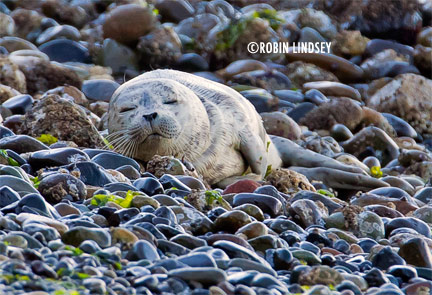
Lugging signboards and stakes into the north end of the heavily wooded park, she could see the white pup resting mid-beach (photo right). The pup had apparently come ashore around the 4am high tide. Awaiting our arrival and keeping people away was reporting party Jeanette. She said, not surprisingly, there had been many off-leash dogs. Thank you, Jeanette and Garet, for keeping the pup safe until we could get there!
A sizable tape perimeter was set with informational signs and a call was placed to Seal Sitters’ scheduler for the day. Connie lined up volunteers who talked to a great many people throughout the morning. The pup was thinner than we like to see and most likely a weaner struggling to get the hang of foraging on his own. Nicknamed Tigger, he (or she) returned to the water around noon, having enjoyed a long snooze. We hope he managed to have a substantial Sunday brunch in the Sound and packs on some blubber.
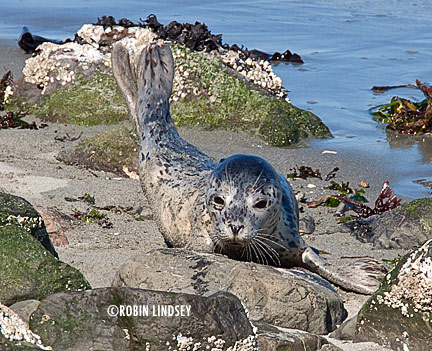
One man respectfully asked why it was necessary to tape off the area at all since there was a fence at the edge of the seawall. We explained that seals have excellent hearing and vision. Prey animals, they are very wary of their surroundings. People standing too close (and directly above) creates undue stress for a pup who desperately needs to rest quietly onshore and warm up.
This pup was on the thin side, too, and it was vital that precious calories weren’t wasted unnecessarily if he was scared into the water - only to have to swim to another location. In a daily struggle for survival, minor inconveniences for people can truly be the difference between life and death for a harbor seal pup.
A couple visiting from Spokane was thrilled at the unexpected sight of the sleek, silver pup on the beach below. So, we dubbed the pup Spokane, which means “children of the sun” in the Interior Salish language. On this very sunny and warm day, the pup was reluctant to return to the cold water. The incoming tide caused him to move several times north along the sand, seeking a little more shut-eye. Volunteers shifted our tape and signs with each move, passing out seal stickers to kids and talking to a steady stream of interested passersby.
Finally around 2pm, with virtually no beach remaining, Spokane swam out into cobalt blue Elliott Bay. Volunteers checked the nearby beaches north and south, removed our materials and some of our die-hard Mariners fans even managed to get home in time to see the bottom of the ninth. Thanks to all of our dedicated volunteers who helped give the pups some quiet time today!
Seal Sitters and pups featured on NPR (KUOW FM)
Sep/07/14 07:49 PM
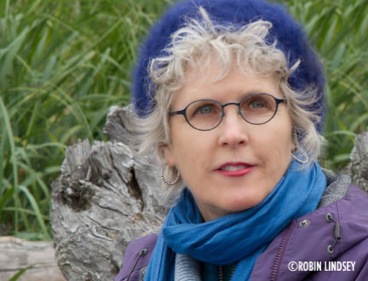
Tune your radio or internet device to KUOW (94.9 FM) Tuesday at noon to hear an interview given by Seal Sitters’ co-founder and acclaimed author Brenda Peterson.
The Record, a feature program Monday - Friday from noon to 1pm on the National Public Radio station in Seattle, is a thought-provoking look at local and national stories. KUOW’s Marcie Sillman talks to Brenda about harbor seal pupping season and the important service that Seal Sitters MMSN and the many other NOAA-authorized marine mammal stranding networks provide.
UPDATE: LISTEN HERE
If you missed the segment, you can listen to the audio here.







